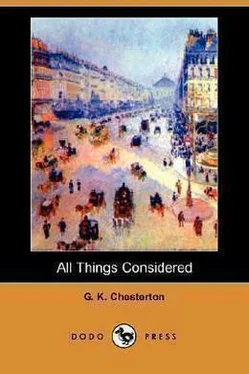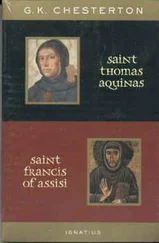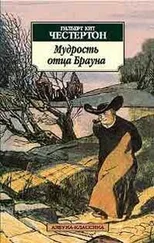A Republican is not a man who wants a Constitution with a President. A Republican is a man who prefers to think of Government as impersonal; he is opposed to the Royalist, who prefers to think of Government as personal. Take the second word, "generally." This is always used as meaning "in the majority of cases." But, again, if we look at the shape and spelling of the word, we shall see that "generally" means something more like "generically," and is akin to such words as "generation" or "regenerate." "Pigs are generally dirty" does not mean that pigs are, in the majority of cases, dirty, but that pigs as a race or genus are dirty, that pigs as pigs are dirty—an important philosophical distinction. Take the third word, "encourage." The word "encourage" is used in such modern sentences in the merely automatic sense of promote; to encourage poetry means merely to advance or assist poetry. But to encourage poetry means properly to put courage into poetry—a fine idea. Take the fourth word, "holidays." As long as that word remains, it will always answer the ignorant slander which asserts that religion was opposed to human cheerfulness; that word will always assert that when a day is holy it should also be happy. Properly spelt, these words all tell a sublime story, like Westminster Abbey. Phonetically spelt, they might lose the last traces of any such story. "Generally" is an exalted metaphysical term; "jenrally" is not. If you "encourage" a man, you pour into him the chivalry of a hundred princes; this does not happen if you merely "inkurrij" him. "Republics," if spelt phonetically, might actually forget to be public. "Holidays," if spelt phonetically, might actually forget to be holy.
Here is a case that has just occurred. A certain magistrate told somebody whom he was examining in court that he or she "should always be polite to the police." I do not know whether the magistrate noticed the circumstance, but the word "polite" and the word "police" have the same origin and meaning. Politeness means the atmosphere and ritual of the city, the symbol of human civilisation. The policeman means the representative and guardian of the city, the symbol of human civilisation. Yet it may be doubted whether the two ideas are commonly connected in the mind. It is probable that we often hear of politeness without thinking of a policeman; it is even possible that our eyes often alight upon a policeman without our thoughts instantly flying to the subject of politeness. Yet the idea of the sacred city is not only the link of them both, it is the only serious justification and the only serious corrective of them both. If politeness means too often a mere frippery, it is because it has not enough to do with serious patriotism and public dignity; if policemen are coarse or casual, it is because they are not sufficiently convinced that they are the servants of the beautiful city and the agents of sweetness and light. Politeness is not really a frippery. Politeness is not really even a thing merely suave and deprecating. Politeness is an armed guard, stern and splendid and vigilant, watching over all the ways of men; in other words, politeness is a policeman. A policeman is not merely a heavy man with a truncheon: a policeman is a machine for the smoothing and sweetening of the accidents of everyday existence. In other words, a policeman is politeness; a veiled image of politeness—sometimes impenetrably veiled. But my point is here that by losing the original idea of the city, which is the force and youth of both the words, both the things actually degenerate. Our politeness loses all manliness because we forget that politeness is only the Greek for patriotism. Our policemen lose all delicacy because we forget that a policeman is only the Greek for something civilised. A policeman should often have the functions of a knight–errant. A policeman should always have the elegance of a knight–errant. But I am not sure that he would succeed any the better n remembering this obligation of romantic grace if his name were spelt phonetically, supposing that it could be spelt phonetically. Some spelling–reformers, I am told, in the poorer parts of London do spell his name phonetically, very phonetically. They call him a "pleeceman." Thus the whole romance of the ancient city disappears from the word, and the policeman's reverent courtesy of demeanour deserts him quite suddenly. This does seem to me the case against any extreme revolution in spelling. If you spell a word wrong you have some temptation to think it wrong.
Humanitarianism and Strength
Somebody writes complaining of something I said about progress. I have forgotten what I said, but I am quite certain that it was (like a certain Mr. Douglas in a poem which I have also forgotten) tender and true. In any case, what I say now is this. Human history is so rich and complicated that you can make out a case for any course of improvement or retrogression. I could make out that the world has been growing more democratic, for the English franchise has certainly grown more democratic. I could also make out that the world has been growing more aristocratic, for the English Public Schools have certainly grown more aristocratic I could prove the decline of militarism by the decline of flogging; I could prove the increase of militarism by the increase of standing armies and conscription. But I can prove anything in this way. I can prove that the world has always been growing greener. Only lately men have invented absinthe and the Westminster Gazette . I could prove the world has grown less green. There are no more Robin Hood foresters, and fields are being covered with houses. I could show that the world was less red with khaki or more red with the new penny stamps. But in all cases progress means progress only in some particular thing. Have you ever noticed that strange line of Tennyson, in which he confesses, half consciously, how very conventional progress is?—
"Let the great world spin for ever down the ringing grooves of change."
Even in praising change, he takes for a simile the most unchanging thing. He calls our modern change a groove. And it is a groove; perhaps there was never anything so groovy.
Nothing would induce me in so idle a monologue as this to discuss adequately a great political matter like the question of the military punishments in Egypt. But I may suggest one broad reality to be observed by both sides, and which is, generally speaking, observed by neither. Whatever else is right, it is utterly wrong to employ the argument that we Europeans must do to savages and Asiatics whatever savages and Asiatics do to us. I have even seen some controversialists use the metaphor, "We must fight them with their own weapons." Very well; let those controversialists take their metaphor, and take it literally. Let us fight the Soudanese with their own weapons. Their own weapons are large, very clumsy knives, with an occasional old–fashioned gun. Their own weapons are also torture and slavery. If we fight them with torture and slavery, we shall be fighting badly, precisely as if we fought them with clumsy knives and old guns. That is the whole strength of our Christian civilisation, that it does fight with its own weapons and not with other people's. It is not true that superiority suggests a tit for tat. It is not true that if a small hooligan puts his tongue out at the Lord Chief Justice, the Lord Chief Justice immediately realises that his only chance of maintaining his position is to put his tongue out at the little hooligan. The hooligan may or may not have any respect at all for the Lord Chief Justice: that is a matter which we may contentedly leave as a solemn psychological mystery. But if the hooligan has any respect at all for the Lord Chief Justice, that respect is certainly extended to the Lord Chief Justice entirely because he does not put his tongue out.
Читать дальше








